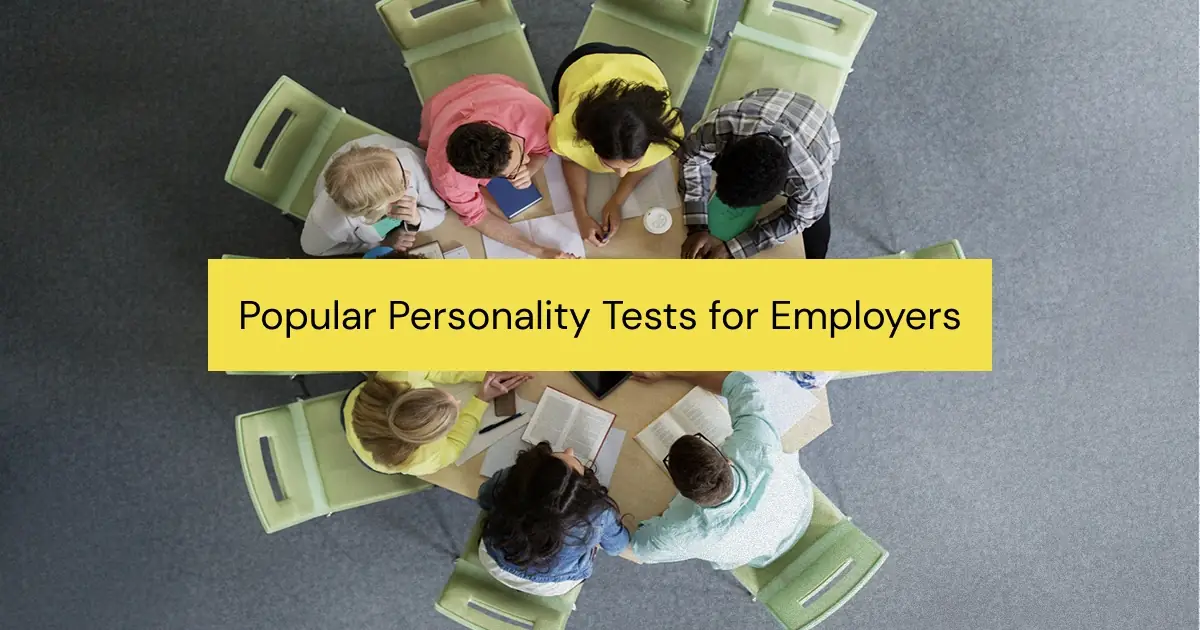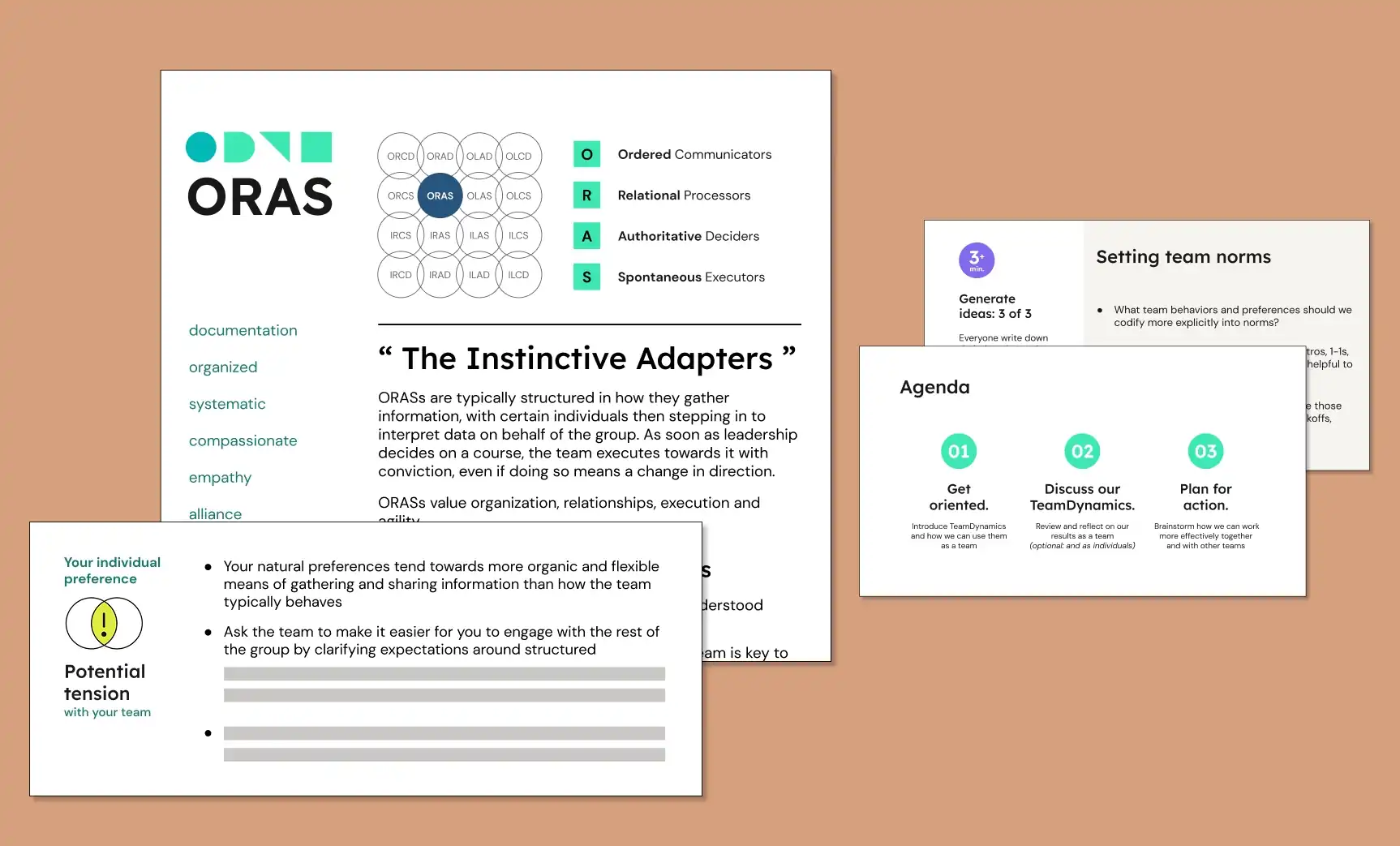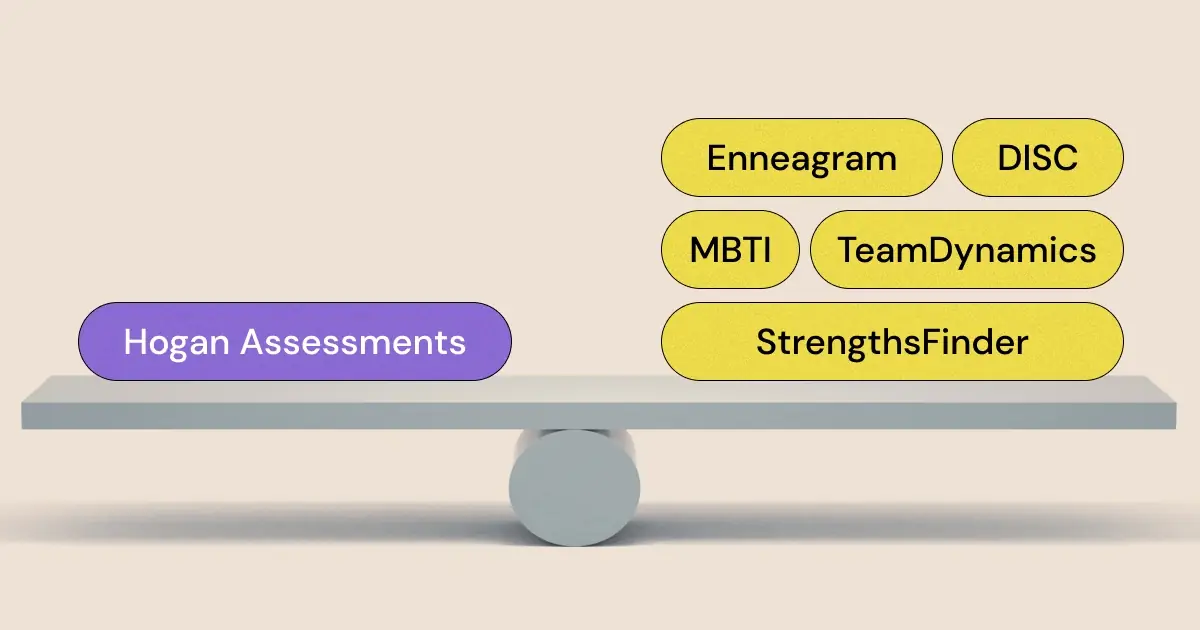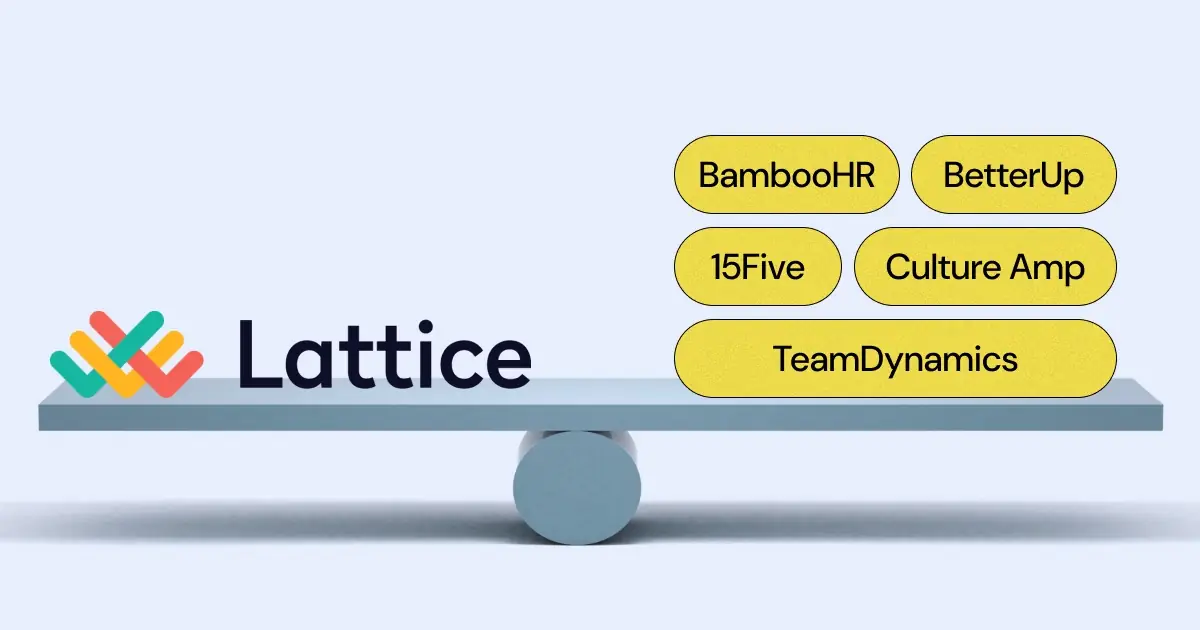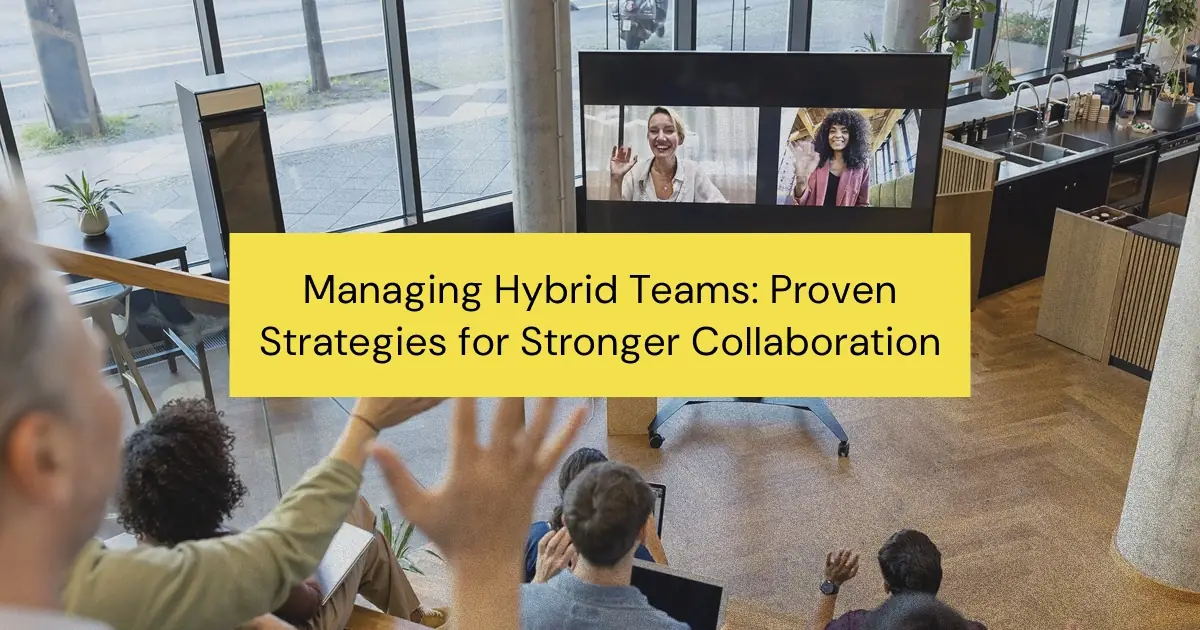Welcome to the fascinating world of workplace dynamics! If you're an employer, team leader, or just someone interested in the inner workings of professional teams, you've likely heard about the power of personality tests. But why are they such a big deal in today's corporate landscape?
Picture this: a workplace where every team member's strengths are not just recognized but optimally utilized, where conflicts are minimal because everyone understands each other's perspectives, and where team cohesion is not just a goal but a reality. This is what understanding personalities at work can achieve.
Personality tests in the workplace are more than just a trend. They are tools that peel back the layers of an individual's character to reveal insights that can be pivotal in team-building and management. From improving communication to strategically assigning roles based on personality traits, these tests are revolutionizing how teams function and thrive.
In the coming sections, we'll walk you through the 10 most popular personality tests that employers are using to decode the complexities of team dynamics. Each of these tests offers a unique lens to view your team, helping you to understand and leverage the diverse personalities that make up your workforce.
So, let’s explore how these personality tests can be your secret weapon in mastering the art of team dynamics, leading to a more harmonious and productive workplace.
The Importance of Personality Tests in Team Building
Why are personality tests becoming a staple in the modern workplace? It's simple: they offer a clear, structured understanding of how different individuals can work together effectively. Imagine having a blueprint for your team’s dynamics, where each person's strengths and weaknesses are laid out clearly. This isn't just helpful; it's transformative.
- Unlocking Team Potential: At the heart of successful teams are individuals who understand not just their own roles, but also how they fit into the bigger picture. Personality tests shed light on this puzzle. They reveal how different personalities can complement each other, making it easier to form well-rounded teams where everyone can shine.
- Enhancing Communication: Ever had a misunderstanding at work? We all have. Often, these stem from different communication styles. Personality tests can be a game-changer here. By understanding the preferred communication styles of your team members, you can tailor your interactions to be more effective and less prone to misunderstandings.
- Conflict Resolution: Let's face it, conflicts are part of any team environment. However, knowing the personality types within your team can help in navigating and resolving conflicts more constructively. When you understand what makes each team member tick, addressing disagreements becomes less about winning and more about finding a middle ground.
- Boosting Morale and Engagement: When employees feel understood and valued for their unique contributions, it naturally leads to higher job satisfaction and engagement. This is especially true for younger professionals, who consistently state that team-building is important to them. Personality tests help managers and team leaders recognize and celebrate these individual contributions, fostering a positive work environment where everyone feels valued.
In essence, the power of personality tests in team building lies in their ability to bring clarity and empathy into the workplace. They help in bridging gaps between different working styles, fostering a culture of mutual respect and understanding. As we delve into the 10 most popular personality tests in the following sections, you’ll see how each of them offers unique insights to help you build stronger, more cohesive teams.
{{inline-cta}}
The 10 Most Popular Personality Tests for Employers
Now that we understand the impact of personality tests on team dynamics, let's explore the top 10 personality tests for work teams that are making waves in the corporate world. Each entry on this list of personality tests offers unique insights into individual traits and how they can mesh together to create a harmonious and productive team environment.
#1. Myers-Briggs Type Indicator (MBTI)
Perhaps the most famous of all, the MBTI categorizes personalities into 16 distinct types based on preferences like introversion vs. extraversion, sensing vs. intuition, and more. It’s a great tool for understanding the diverse ways your team members process information and interact with the world.
Use the Myers-Briggs Personality Test when you want to explore how different personality types can affect workplace dynamics, communication styles, and team roles. Want something else? Check out the 5 best MBTI alternatives.
#2. DISC Assessment
Focusing on four primary behavior traits — Dominance, Influence, Steadiness, and Conscientiousness — DISC helps in understanding communication styles and how team members are likely to react to challenges and tasks.
Select the DISC personality test for understanding and improving communication and work styles within teams, especially in leadership and conflict resolution. Want something else? Check out the 5 best DiSC alternatives.
#3. TeamDynamics
Referred to as "the personality test for teams," TeamDynamics assesses how a group of individuals communicate and collaborate to get work done. By uncovering how a team Communicates information, Processes information, Decides on a course of action, and Executes towards its objectives, TeamDynamics helps teams build better practices when working together and with other groups. TeamDynamics is often considered the most useful of the personality tests for team building.
Choose TeamDynamics when your goal is team building, especially when looking to improve how your team communicates, shares information, collaborates on decisions, and completes projects.
#4. Big Five Personality Traits
This test evaluates individuals based on five key traits: openness, conscientiousness, extraversion, agreeableness, and neuroticism. Big Five is widely respected for its scientific basis and helps in predicting how team members might behave in various scenarios.
Opt for the Big Five Personality Traits test when seeking a scientifically robust framework to assess broad personality dimensions and predict behavior in various settings. Want something else? Check out the 5 best Big Five (OCEAN) alternatives.
#5. StrengthsFinder (CliftonStrengths)
Now known as CliftonStrengths, this test helps individuals identify their top strengths. Understanding these can lead to more effective team compositions, with each member playing to their strong suits.
Choose StrengthsFinder when you aim to uncover and leverage individual talents within a team, focusing on maximizing each person's potential. Want something else? Check out the 5 best StrengthsFinder alternatives.
#6. 16Personalities
Based on the MBTI and the Big Five, this test offers a nuanced look at personality, combining traditional categories with role and strategy types to provide a comprehensive view of an individual's personality.
Use 16Personalities for a comprehensive and accessible understanding of personality types, combining elements of MBTI and the Big Five, suitable for personal development and team building. Want something different? Here are the 5 best alternatives to 16Personalities.
#7. Hogan Assessments
Hogan Assessments are designed to understand the personality beneath the surface - the 'dark side' traits that might emerge under stress, which is crucial for high-stakes environments.
Hogan Assessments are ideal when it’s crucial to understand personality under stress or to predict potential derailers in leadership roles. Want something different? Learn about the top 5 alternatives to Hogan Assessments.
#8. Belbin Team Roles
Unique in its approach, Belbin Team Roles identifies the specific roles individuals are most suited to in a team setting, such as 'The Implementer' or 'The Coordinator,' helping to create balanced teams. This goes way beyond the 4 work personality types test to understand the natural inclinations of each team member.
Select Belbin Team Roles to identify and balance the different roles required for effective teamwork, ensuring that each critical role is filled within a team. Looking for an alternative? We explore the 5 best alternatives to Belbin Team Roles.
#9. Enneagram
This test categorizes personalities into nine types. Enneagram is particularly useful for personal development and understanding deeper motivations and fears that can influence work behavior.
Use the Enneagram for deep personal growth and understanding, as it provides insights into core motivations and fears that can influence workplace behavior. Want something else? Check out the 5 best Enneagram alternatives.
#10. Predictive Index Behavioral Assessment
This tool focuses on four key personality traits and is used to predict workplace behaviors. Predictive Index aids in recruitment and team alignment strategies.
Opt for the Predictive Index Behavioral Assessment when you need a quick and effective tool for talent acquisition, team alignment, and leadership development. Want something else? Check out the 5 best Predictive Index alternatives.
Each of these tests offers a unique lens to view your team, uncovering the intricate tapestry of personalities that can either fuel or hinder team success.
Special Spotlight: TeamDynamics
In the realm of personality tests, TeamDynamics stands out as a tool specifically engineered for understanding and enhancing team interactions. Let’s take a closer look at what makes TeamDynamics the ideal personality test for work teams and a unique choice for employers seeking to unlock the full potential of their teams.
- Tailored for Teams: Unlike tests that focus solely on individual traits, TeamDynamics is designed with the whole team in mind. It assesses how a team's emergent behavioral preferences come together to define a group's interactions. This means you get insights not just on each team member, but on the team as a collective entity.
- Enhancing Communication and Collaboration: By pinpointing the communication styles and collaboration preferences of the team, TeamDynamics helps in crafting strategies that enhance teamwork. It fosters an environment where everyone feels heard and valued, leading to improved morale and productivity.
- Improving Individual Performance: TeamDynamics provides each team member with an analysis of where they more or less naturally align with the team's behavioral norms, as well as targeted coaching to improve individual job performance and satisfaction.
- Conflict Resolution: TeamDynamics also plays a key role in mitigating conflicts within teams. By understanding the underlying personality dynamics, it becomes easier to address and resolve disputes, turning potential conflicts into constructive conversations.
- Driving Team Development: Beyond immediate team-building, TeamDynamics is a powerful tool for long-term team development. It aids in identifying areas for growth and provides actionable insights for continuous improvement, ensuring that your team remains dynamic and adaptable in the ever-evolving corporate landscape.
In essence, TeamDynamics isn’t just another personality test; it’s a comprehensive solution for understanding and enhancing the way your team works together. Whether you're looking to build a new team from scratch or refine an existing one, TeamDynamics offers the insights and guidance needed to create a harmonious, productive team environment.
Comparing the 10 Most Popular Workplace Personality Tests
So which of these popular personality tests for work is the right choice for you and your organization? Take a look at this simple comparison table to find out!
| Personality Test |
Focus Area |
Best For |
Key Features |
| Myers-Briggs Type Indicator (MBTI) |
Personality Preferences |
Improving communication, conflict resolution, and leadership styles through personality insights |
Categorizes individuals into 16 types; explores how people perceive, decide, and interact with others. |
| DiSC Assessment |
Behavior Styles |
Understanding work styles, enhancing communication, and resolving conflicts in workplace teams |
Identifies four behavioral styles; provides actionable insights for improving teamwork and communication. |
| TeamDynamics |
Team Behaviors |
Optimizing team collaboration, communication, and project execution in workplace settings |
Analyzes team behaviors and individual alignment with team norms; provides actionable strategies for better teamwork. |
| Big Five Personality Traits |
Comprehensive Personality Traits |
Predicting behavior, team composition, and personal development |
Evaluates Openness, Conscientiousness, Extraversion, Agreeableness, and Neuroticism; backed by strong scientific research. |
| StrengthsFinder (CliftonStrengths) |
Individual Strengths |
Identifying and leveraging individual strengths within teams |
Highlights individual strengths from 34 themes; provides a positive framework for personal and team growth. |
| 16Personalities |
Blended Personality Insights |
Personal growth and team understanding with MBTI and Big Five influences |
Combines elements of MBTI and Big Five; accessible and easy-to-understand profiles for teams and individuals. |
| Hogan Assessments |
Workplace Potential and Risks |
High-stakes environments needing insights on leadership risks and stress behavior |
Focuses on strengths, potential derailers under stress, and organizational impact. |
| Belbin Team Roles |
Team Role Identification |
Balancing team roles for effective collaboration and project outcomes |
Identifies specific roles (e.g., Coordinator, Implementer) for team balance and success. |
| Enneagram |
Core Motivations |
Deep personal growth and improving team empathy |
Explores motivations, fears, and growth paths across nine types; enhances empathy and collaboration. |
| Predictive Index Behavioral Assessment |
Workplace Behavior Prediction |
Recruitment, leadership alignment, and team fit |
Focuses on four key workplace traits; predicts behavior for hiring and alignment. |
Why TeamDynamics Stands Out
Among these widely-used tools, TeamDynamics emerges as the best choice for professional team-building:
- Team-Centric Design: Unlike individual-focused tests like MBTI or Enneagram, TeamDynamics analyzes team behaviors, offering collective insights for workplace improvement.
- Actionable Insights: Delivers practical strategies to address common teamwork challenges in communication, collaboration, and decision-making.
- Alignment Analysis: Examines how individual preferences align with the team’s collective behaviors, providing a roadmap for fostering harmony and reducing friction.
If you’re aiming for a practical, team-focused approach to enhance collaboration and productivity, TeamDynamics is the superior choice. Start your journey toward a cohesive and high-performing team today!
How to Implement Personality Tests in Your Organization
Now that you're familiar with the top personality tests available, the next step is implementing them effectively in your organization. This process, when done right, can transform your team dynamics and lead to a more harmonious and productive work environment.
- Choose the Right Test: Start by identifying the specific needs of your team. Do you need a test for better communication, understanding work styles, or managing conflict? Select a test that aligns with your objectives, like MBTI for communication styles, TeamDynamics for team building, or the DISC assessment for leadership development.
- Communicate the Purpose: It's crucial to explain to your team why you're using these tests. Emphasize that the goal is to enhance teamwork and personal growth, not to pigeonhole or label them.
- Create a Safe Environment: Ensure your team understands that the results are for internal development only. Create an atmosphere of trust where team members feel comfortable sharing and discussing their results.
- Integrate into Team Practices: Use the insights from these tests to guide team meetings, project assignments, and conflict resolution strategies. For example, if the Big Five Personality Traits test shows a mix of introverts and extroverts, balance your meeting styles to accommodate both.
- Ongoing Development: Personality test results are not just a one-time activity. Use them as a foundation for ongoing development. For instance, StrengthsFinder results can guide career development discussions.
- Leverage Technology: Tools like TeamDynamics can be administered electronically and integrated into your regular HR practices, providing continuous insights and support for team management.
- Measure Impact: Finally, track the impact of these tests on your team’s performance. Look for improvements in areas like communication, project completion, and overall team satisfaction.
Implementing personality tests in your organization is not just about understanding your team better. It’s about creating a work culture where every individual’s strengths are recognized and utilized, leading to a more engaged, productive, and satisfied team.
Case Studies and Success Stories
Nothing speaks louder than real-life examples. In this section, we'll explore how various companies have successfully implemented personality tests to enhance team dynamics, boost productivity, and create a more positive workplace culture.
- Transforming Communication with MBTI: A tech startup used the MBTI to understand diverse communication styles within its team. This led to tailored communication strategies, resulting in a 30% reduction in misunderstandings and a noticeable improvement in project collaboration efficiency.
- DISC Assessment for Leadership Development: A medium-sized retail company implemented the DISC Assessment for its management team. The result was a more cohesive leadership style that resonated with all employees, leading to a 20% increase in employee satisfaction scores.
- TeamDynamics for Enhanced Team Building: A marketing team for a publicly traded technology company used TeamDynamics to improve how its team collaborated to make decisions and execute its projects. It then used its TeamDynamics to educate other parts of the organization on how best to interact with the marketing function.
- Big Five Personality Traits for Team Composition: A marketing agency used the Big Five Personality Traits test to assemble balanced project teams. This strategic team composition led to a 25% increase in campaign effectiveness and client satisfaction.
- StrengthsFinder Driving Individual Performance: An IT firm integrated StrengthsFinder into its employee development program. By aligning tasks with individual strengths, they saw a 15% increase in productivity and a significant drop in staff turnover.
- 16Personalities to Break the Ice: A non-profit organization used 16Personalities for a fun ice breaker. The insights gained improved mutual understanding and respect among team members, leading to more effective collaboration on projects.
- Hogan Assessments in High-Stakes Environments: A financial institution used Hogan Assessments for its executive team to understand potential stress-triggered behaviors. This led to a more resilient leadership during high-pressure periods, maintaining team stability and performance.
- Belbin Team Roles for Project Success: An engineering company applied Belbin Team Roles to optimize project teams. This resulted in faster project completion times and a 20% increase in client satisfaction due to improved project outcomes.
- Enneagram for Personal Development: A healthcare provider used the Enneagram for staff personal development. This led to improved empathy and understanding among staff, enhancing patient care and employee well-being.
- Predictive Index in Talent Acquisition: A manufacturing company used the Predictive Index Behavioral Assessment in their hiring process. This led to a better alignment of new hires with company culture, reducing onboarding time by 30%.
These success stories showcase the tangible benefits of using personality tests in various organizational settings. By understanding and applying the unique characteristics of team members, these companies have been able to foster a more collaborative, productive, and satisfying work environment. And cost-conscious organizations can often find a free workplace personality test to meet their needs.
Conclusion
As we've journeyed through the world of personality tests, it's clear that understanding the diverse personalities within a team isn't just a nice-to-have; it's essential for fostering a productive, harmonious, and dynamic work environment. From the MBTI’s deep dive into how we interact with the world to the predictive power of assessments like the Predictive Index, each test offers unique insights into the human element of our workplaces.
Embracing these tools is not about categorizing people into boxes. Rather, it's about appreciating the vast spectrum of human qualities and leveraging this knowledge to create teams that are greater than the sum of their parts. Whether it's enhancing communication, resolving conflicts, or building on individual strengths, personality tests provide a roadmap for navigating the complex interpersonal dynamics of the workplace.
In today's fast-paced and ever-evolving business world, understanding and valuing each team member's unique personality can be a game-changer. It leads to not just better teams but also to a more inclusive and engaging work culture where everyone feels valued and understood.
So, as you consider the insights from this guide, think about how you can apply these tools in your organization. Remember, the goal is to unlock potential, build understanding, and drive success through the power of a well-understood and well-utilized team.


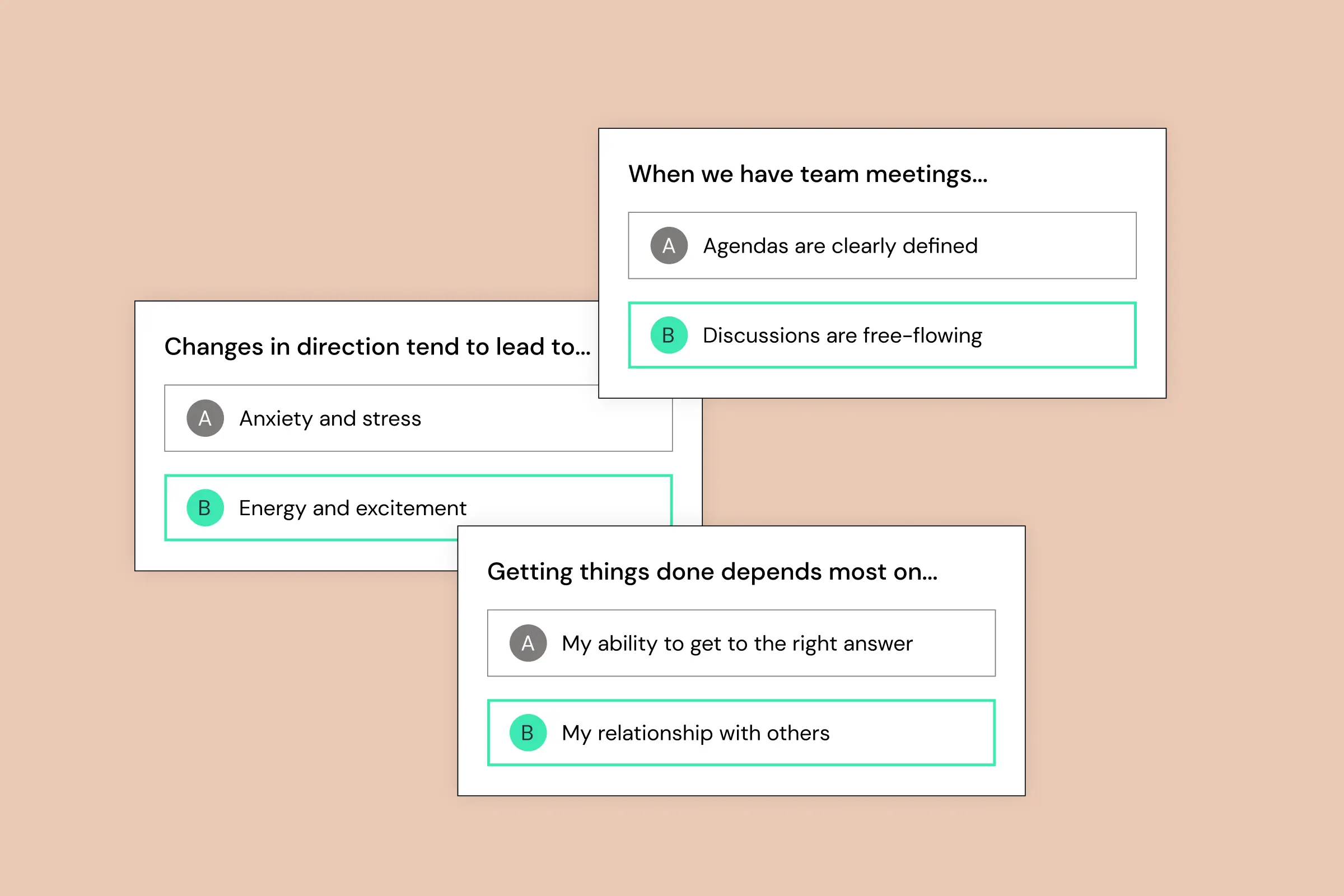

.png)
